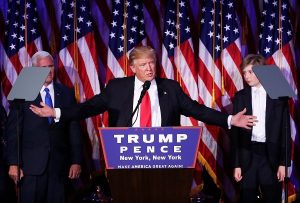 VOA News (New York, Washington) — Donald Trump will be the next president of the United States.
VOA News (New York, Washington) — Donald Trump will be the next president of the United States.
The billionaire businessman, who was widely underestimated and even mocked by the political and media class throughout his campaign, pulled off a stunning and decisive win Tuesday over his rival, ex-Secretary of State Hillary Clinton.
“I pledge to every citizen of our land to be a president for all Americans,” said an exuberant Trump, surrounded by his family and top aides at a victory party in New York City early Wednesday.
President Barack Obama congratulated Trump over the phone and invited the president-elect to meet with him at the White House on Thursday.
“Ensuring a smooth transition of power is one of the top priorities the President identified at the beginning of the year and a meeting with the President-elect is the next step,” Press Secretary Josh Earnest said.
First elective office
It is an improbable victory for a candidate who has never held elected office and who ran one of the most unorthodox campaigns in U.S. history. It also brings to an end one of the most contentious and divisive presidential campaigns in recent memory.
Trump, a Republican, captured at least 288 electoral votes compared with 215 for the Democrat Clinton, according to figures early Wednesday. Despite his strong electoral vote tally, Trump appeared to be headed for a narrow loss in the popular vote. It would be just the fourth time in U.S. history that the presidential winner has lost the popular vote.
At Trump headquarters, the scene was jubilant, though remnants of a divisive campaign were still evident. Even as it became clear that Trump would win, his supporters repeatedly broke out in chants of “lock her up,” referring to the Democratic nominee.
“There was tremendous excitement among Trump supporters to begin with, and it grew and grew as results started coming in,” says White House correspondent Mary Alice Salinas, who was at the Trump victory party. “Many Trump supporters say they aren’t surprised at the win — they knew the polls were better for Trump than many had expected.”
Investors reacted less positively, with global markets and U.S. stock futures sent into turmoil as it became clear Trump would win.
Polling failure
Trump’s victory amounts to a massive failure for opinion polls, which showed Clinton with a seemingly safe 3-4 point lead in the final days of the campaign. Many respected pollsters had put her odds of winning at more than 90 percent. Continue reading
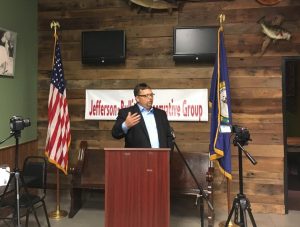 This week, three local candidates running for office held a town hall forum where they took questions from the voters. Michael Payne, Harold Bratcher, and Shane Ranschaert each had a turn at the microphone where they were able to talk not only about policies, but also about why they became involved in politics. All three candidates are running for office for the first time, and all three are unhappy with the state of politics in the Louisville area and felt that the best way to help the community is to become involved. With the election fast approaching and the Presidential race garnering so much attention, it can be easy to lose track of local races.
This week, three local candidates running for office held a town hall forum where they took questions from the voters. Michael Payne, Harold Bratcher, and Shane Ranschaert each had a turn at the microphone where they were able to talk not only about policies, but also about why they became involved in politics. All three candidates are running for office for the first time, and all three are unhappy with the state of politics in the Louisville area and felt that the best way to help the community is to become involved. With the election fast approaching and the Presidential race garnering so much attention, it can be easy to lose track of local races.
Harold Bratcher is running the US House of Representatives, District 3. District 3 in KY is all of Jefferson County, and therefore, all of Louisville. Representatives will go to Washington D.C. to represent all the citizens on Louisville in the United States Congress for a 2-year term. Bratcher graduated from Valley High School (class of 1991) and we worked for some trucking companies. He recently opened his own freight company and has been operating out of Louisville since 2013. Bratcher is running against incumbent John Yarmuth, who is seeking re-election for his sixth term.
Bratcher focused on three major talking points: supporting small business, preserving the Constitution, and immigration. Being a small business owner himself, Bratcher knows a lot about what is needed to run a small business. NAFTA and TPP have been brief topics in the recent presidential debates, but Bratcher has believed for years that NAFTA has negatively impacted this country’s economy and believes that the TPP will be just as bad, if not worse. “NAFTA cost a minimum of 1 million union, and non-union high paying manufacturing jobs,” he said, adding that this equals about 25% of the manufacturing capacity that was here previously. With the unemployment rate being as high as it is, he believes the answer is to invest in small business. “Giving $100 million to 100 small businesses will create more jobs than giving that money to one big corporation,” he said. He also proposes cutting taxes across the board, which he believes will create more jobs and by putting more money in consumer pockets, will result in more revenue in taxes.
Bratcher identified himself as a “Constitutional Conservative” and believes that government needs to be smaller and less involved in our everyday lives. He applies this to every Constitutional right, including the first and second amendments. He admitted that he is a new firearm enthusiast, but recognizes that the laws being proposed are already in place in some of the highest gun crime cities in the nation. “If the laws don’t work in Chicago, why would they work here,” he asked. He also believes that individual, civilian gun-ownership keeps America is safer as nation. Bratcher went on to talk about balancing the budget: “Everyone is concerned about the D and the R. This is why we have no balanced budget and this is why there is gridlock. I’m willing to work towards the middle, but it needs to be a give and take.”
Being the only candidate running for a federal office, Bratcher was the only one to talk about immigration. Bratcher understands that this is a country of immigrants and accepts immigrants who come to the United States legally. His first concern, however, is that we have millions of homeless Americans here and we should address that problem before trying to take on the task of helping other countries.
Michael Payne is running for State Representative, District 28. District 28 starts in the southern part of Pleasure Ridge Park and continues south along Dixie Highway to West Point, KY. State Representatives go to Frankfort, KY where, like the federal House of Representatives, they serve a 2 year-term where they represent a portion of Kentucky residents for state legislation. Payne is a graduate of Valley High School (class of 1990) and went on to study at both Sullivan University and University of Louisville. He has worked as an engineering specialist for UPS, an engineering manager for a local material handling firm, and currently works at Sullivan College as an instructor. Payne is running against incumbent Charles Miller, who is currently seeking re-election for his tenth term.
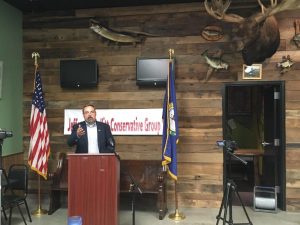 Payne focused on several major talking points: the economic depression, the education system, and crime. Payne believes that best way to address the economic issues is to attract new businesses into the state and Kentucky is having a hard time competing with the surrounding states. He stated that the best way to encourage investments into the state and to encourage entrepreneurs is to reform the tax code with a flat tax and improve the work force through training programs that promote hands on, technical skills.
Payne focused on several major talking points: the economic depression, the education system, and crime. Payne believes that best way to address the economic issues is to attract new businesses into the state and Kentucky is having a hard time competing with the surrounding states. He stated that the best way to encourage investments into the state and to encourage entrepreneurs is to reform the tax code with a flat tax and improve the work force through training programs that promote hands on, technical skills.
When it came to education, Payne said, “Don’t throw more money at the problems.” He feels that teachers are being prevented from doing the jobs because of curriculum standards as well as social standards. He believes teachers know best on how to teach their students and that the state needs to take a step back and allow them to teach. Further, Payne says that he would like to see subject matter experts within a field to be allowed to teach without the need for certifications. He feels that this would enable students to learn more and encourage critical thinking. As for higher education, Payne said tuition rates need to be frozen and universities need to start acting like the businesses that they are, not charities. Payne also believes that public universities should be opened up to accommodate concealed carry weapons for license holders on campus while private universities should be left to decide on this issue for themselves.
The heroin epidemic and the rising crime rate has effected everyone in the community. Payne believes that law enforcement needs to be given more ability to do what is needed, and that the judicial system needs to be able to sentence certain offenders more. While believing that dealers and other distributors need to be held accountable, he believes that there needs to be a “compassionate hand to the addicts”. Once in jail, rehabilitation programs need to start and programs need to be in place that allow the addicts access to affordable treatment when they leave jail.
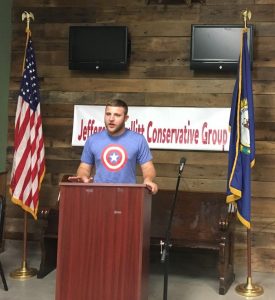 Shane Ranschaert is running for Metro Council, District 14. District 14 is in the far southwest portion of the county, including most of Valley Station west of Dixie Highway between Greenwood Rd and the Gene Snyder, south to include Valley Village, areas surrounding Jefferson Forest to the county line. Councilmembers stay in Louisville where they represent their district for a four-year term. Ranschaert is running against incumbent Cindi Fowler, who is seeking re-election for her second term.
Shane Ranschaert is running for Metro Council, District 14. District 14 is in the far southwest portion of the county, including most of Valley Station west of Dixie Highway between Greenwood Rd and the Gene Snyder, south to include Valley Village, areas surrounding Jefferson Forest to the county line. Councilmembers stay in Louisville where they represent their district for a four-year term. Ranschaert is running against incumbent Cindi Fowler, who is seeking re-election for her second term.
Ranschaert also had three talking points: adequate representation for the southwest portion of the city, taxes and regulations, and the rise in crime and heroin use. Ranschaert said he is tired of seeing Southwest Louisville ignored until election time and he wants to make sure that the residents of District 14 feel like they matter all the time, not just when politicians are seeking votes. Ranschaert explained that he would like to see taxes in the city cut, stating that Louisville is the third most taxed city in the US and one of the most regulated cities in the US. He wants to cut taxes and address infrastructure issues, such as the malfunctioning flood pumps along the Ohio River. He cited a similar plan to Payne’s for addressing the rise in heroin use and crime and wants police to be able to more effectively perform their duties, and wants to see task forces developed to utilize all local agencies to make Louisville as uncomfortable as possible for drug dealers. He also wants to see addicts being helped and treated and not just pushed through the system.
If you did not have the chance to attend the town hall, all the candidates have contact information on their websites and all three candidates have Facebook pages and welcome your questions. As with any election, it is important to be informed and voters should take the time to research the candidates before making a decision. A sample ballot for your location can be found on the Jefferson County Clerk’s website. The deadline to register to vote in this election cycle was October 11. If you are not registered to vote, you can still register, but you will be eligible to vote in the next May primary.
This Tuesday, October 18th at 6:30 PM, there will be a town hall forum that will have candidates Harold Bratcher and Michael Payne available to take questions from community members.
Bratcher is running for the US House of Representatives for Kentucky’s 3rd district. The House of Representatives is one of half of the legislative branch at the federal level. Each state has a different number of representatives that correlate to the population of that state. Each term in the House is 2 years. Bratcher is running for Kentucky’s third district, which represents all of Jefferson County. Bratcher is opposing incumbent John Yarmuth, who has held the office since 2007 and is currently seeking re-election for his sixth term. More information about Harold Bratcher can be found on his website.
Michael Payne is running for State Representative, District 28. As seen with Congress at the federal level, each state has their own two-part legislature. District 28 represents a portion of the southwestern portion of the county, from parts of Pleasure Ridge Park south along Dixie Highway to West Point, including Valley Station, Valley Village, and Prairie Village. Each term for the State representatives is 2 years. Payne is opposing incumbent Charles Miller, who has held the office since 1999 and is currently seeking re-election for his tenth term. More information about Michael Payne can be found on his website.
The forum is a town hall style, meaning community members who attend will be able to ask questions directly to the candidates. The meeting is at La Carretta at 10105 Dixie Highway (due to construction, people traveling south on Dixie Highway will find it easier to access the shopping center parking lot by turning left at Valley Station Road, and turning left into the shopping center). The meeting starts at 6:30 PM.
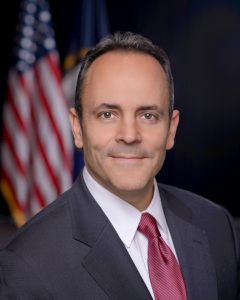 Gov. Matt Bevin today cited the results of a study proving there has been dramatic growth in the number and reach of administrative regulations in Kentucky, many of which are unnecessary or outdated.
Gov. Matt Bevin today cited the results of a study proving there has been dramatic growth in the number and reach of administrative regulations in Kentucky, many of which are unnecessary or outdated.
The Mercatus Center at George Mason University reports that the Kentucky regulatory code, published as the Kentucky Administrative Regulations Service (KARS) grew from a total of four books in 1975 to 14 books in 2015, an increase of 250 percent. In 2015, the regulatory code contained 6.6 million words and 129,575 restrictions.
“The most recent Mercatus Report shows that Kentucky continues to be one of the most highly regulated states in America,” said Gov. Bevin. “Many of these regulations are outdated, redundant or simply unnecessary. We are suffocating economic growth and production in the Commonwealth for no constructive reason. This report reaffirms why our Red Tape Reduction Initiative is so important. We encourage all Kentuckians to go to RedTapeReduction.com and tell us how we can simplify the process for doing business in Kentucky.”
According to the Mercatus study, the chemical manufacturing industry in Kentucky faces the most administrative restrictions, with nearly 4,200. Animal production and aquaculture is second, with more than 4,100; followed by ambulatory health care services, with 3,500; food manufacturing, with 3,250; and nursing and residential care facilities, with almost 2,400.
Gov. Bevin announced the Red Tape Reduction Initiative in July, with the goal of cutting through the red tape of excessive and complex regulatory burdens. By reducing the amount of bureaucracy affecting Kentucky businesses, the Commonwealth can lift unreasonable hardship off the shoulders of Kentucky’s business community.
Gov. Bevin first began the process by instructing cabinet secretaries to start a thorough review of all government regulations currently on the books, then extended the invitation to businesses and employees throughout the state. Since July, www.RedTapeReduction.com, the site where people are instructed to submit regulations, has received some 14,000 visits, and 500+ suggestions have been received and are being evaluated.
The report from Mercatus can be accessed at http://mercatus.org/publication/kentucky-regulation-2015.
For more information on the initiative or to submit a suggestion on a regulation that should be reviewed, please visit www.RedTapeReduction.com.
Below is a statement from Press Secretary Amanda Stamper on today’s Supreme Court of Kentucky ruling in university allotment case:
“We are disappointed in the Court’s decision today and strongly disagree with its reasoning. The Attorney General clearly does not understand the severity of the pension problem which became the nation’s worst funded plan under the watch of his father’s administration.
“Today’s ruling only affects $18 million of the universities’ overall budgets which is 0.0027 of their annual $6.6 billion expenditures. Nonetheless, we have to be vigilant about every taxpayer dollar spent if we are going to solve our pension crisis.
“The Commonwealth’s public universities have thousands of employees who participate in our pension system and, having such a large stake, should be part of the solution to fix the state’s $35 billion underfunded pension liability. Gov. Bevin recognizes that preserving our retirement systems for state workers and retirees is both a legal and moral obligation.
“We remain determined to fix Kentucky’s pension crisis, no matter the opposition. This administration will continue to use every available tool to solve our pressing financial problem.”
Councilman Kevin Kramer of District 11 and Councilman Stuart Benson of District 20 will be holding a town hall meeting tonight at the Jeffersontown Fire Department (10540 Watterson Trail). The meeting will start at 6:30 PM.
The councilmen will be present as well as officials for other local government agencies to answer any questions. The meeting will include an update on the Urton Lane Project.
For more information, contact the office of Councilman Stuart Benson at 574-1120.
Since the current Governor of Indiana, Mike Pence, is running as Vice-President on the Republican ticket with Donald Trump, he is unable to run for re-election as Governor. A replacement candidate needed to be found.
22 members of the Indiana Republican State Committee held a meeting earlier this week to determine who would be the Republican candidate for Governor this year.The choice included big names, such as Lieutenant Governor Eric Holcomb, US Representative Susan Brooks, US Representative Todd Rokita and State Senator Jim Tomes.
The meeting lasted a few hours and the committee announced that Lt. Gov. Eric Holcomb will be the candidate this election cycle. The announcement did not surprise many since Governor Pence endorsed Holcomb last week. Holcomb has not named a running mate for Lieutenant Governor yet, but he will be running against:
- John Gregg (Democrat) with Christina Hale
- Rex Bell (Libertarian) with Karl Tatgenhorst
- Adam Adkins (Write-in) – no running mate named at this time
- Christopher Stried (Write-in) – no running mate named at this time
Gregg also ran in 2012 against Pence. Pence narrowly won that election with 49.5% of the vote (Gregg had 46.6% and Libertarian candidate Rupert Boneham had 4%). Polls from earlier this year show that Pence and Gregg were nearly tied, but Pence did have a slightly lead in May. It is unclear how close Holcomb and Gregg are at this time.
Brooks and Rokita both had to remove their names from the ballots for the US House of Representatives, but both intend to seek re-election in their districts. Both are still eligible to be placed on the ballot in November.
 Weather
Weather Traffic
Traffic @LouisvilleDispatch
@LouisvilleDispatch @LouisvilleDisp
@LouisvilleDisp Subscribe
Subscribe